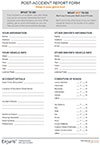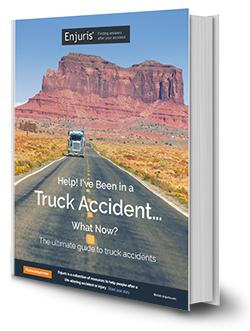Commercial vehicle crashes and how they affect you
When a big rig drives by your car, blocking out the sun and looming like an angry god, you always tense up – just a little bit – until it passes by.
Trucks and tractor trailers are enormous metal monsters that can destroy your dinky car in an instant. On the clogged, overcrowded highways of Florida, the probability of these accidents happening can skyrocket.
In 2016, there were 44,307 commercial vehicle crashes in Florida. Given that there are so many big roads slicing through the state that allow products to flow from one place to another, these trucks play a large role in making commerce happen. However, there is much collateral damage to be considered.
Tweet this
This article will cover how to protect yourself in the event of a truck or tractor trailer accident in Florida, how to handle it most efficiently and how the state's internal mechanisms are different from the rest of the country.
Truck accident statistics in Florida
The most affected individuals in truck and tractor trailer accidents are passenger vehicle occupants. Why is that? Well, think about the size difference. Trucks are 20-30 times bigger and also have undercarriage clearance, which means that passenger cars can get trapped underneath.
Trucks also take much longer to stop, given their larger size. They take, on average, 20-40% longer to stop than passenger vehicles, and that can take even longer if road conditions are affected by snow or rain. Additionally, the driver might be exhausted and not paying as much attention – federal regulations allow drivers to work for 11 hours at a time and up to 77 hours over a seven-day period.
In 2015, Florida had the following statistics:
- 3,852 people died in large truck crashes
- 16% were truck occupants, 69% were occupants of passenger cars, and 15% were pedestrians, bicyclists or motorists
- 53% of deaths in large trucks occurred on major roads other than interstates on freeways, 30% occurred on interstates and freeways, and 14% occurred on minor roads
- 42% of large truck crash deaths were between 6 am and 3 pm, compared with 30% of crash deaths that did not involve large trucks
- Truck accident deaths are on a decline (they were at an all-time high in 1979)
- Truck drivers in fatal crashes rarely have high blood alcohol concentrations.*
*Truck drivers are subject to very strict governmental regulations concerning alcohol and driving. That is why only 3% of fatally injured large truck drivers had BACs at or above 0.08% in 2015. Compare that to 30% of fatally injured passenger vehicle drivers in 2015 with BACs at or above 0.08% (still a vast improvement from 1982, when it was 51%).
The immediate aftermath of a tractor trailer accident in Florida
An 18-wheeler can weigh up to 80,000 pounds when fully loaded with cargo, while a passenger car can weigh about 4,000 pounds. This means that, thanks to the laws of physics, the passenger car is most likely to be disfavored in a matchup of the two.
Tractor trailer accidents are different than normal car accidents.
Much of the time, they can be multi-car pileups, simply because when a big rig starts sliding on a highway, it's going to take everyone out. This means that your car could hit far more than just the truck itself. It could hit medians, trees, other cars, the undercarriage of the truck, cargo in the truck that falls out or anything else in the immediate area.

Sample post-accident report form to keep in your glove box - fill out at the scene or as soon as you can after a car accident
Download in PDF format
The most important thing in any vehicle accident is to assess your injuries. Things are going to be loud, confusing and terrifying right after the accident. You might not understand what's going on. Do a body scan and try to see if anything's bleeding or broken – if you're not sure, remain calm and wait for medical attention. Check on your passengers if you can.
Then, once the most important details have been dealt with, do the following:
- Call the police: There will be damage here, there's no question. With passenger cars, sometimes you can get away with a dented bumper and handle things privately with the other driver in order not to involve insurance companies, but that won't be the case here. The truck will likely destroy your car. That's why they carry such high insurance policies. The cops will need to take down detailed information, and their account will become the official record. Your insurance company will need those details. Move your car to the side of the road to maintain the flow of traffic; if it is too damaged to be moved, turn on the hazard lights and wait until police arrive.
- Exchange information: Don't say more than your name and your insurance information to the truck driver, because anything you say can be used against you later. Make sure to get his or her name, contact information, insurance information, trucking company information, license plate, truck make and model, and driver's license number. The trucking company will likely have a separate attorney representing it while the driver has his own lawyer, and they will both be aggressive. Don't sign anything without your own counsel reviewing it, no matter what they say. They're not your friend in this scenario.
- Photograph the scene and injuries: Your attorney will thank you from the bottom of his heart. Injuries can heal fast or be hard to see, and the cops might not take as many photos as you need. Use your phone and take pictures of anything that you think might be relevant – cuts, bruises, the cars, the weather, the truck, license plates, witnesses – because you can always take too many photos, but taking too few is never helpful.
- Write down witness information: This is imperative, because witnesses often leave town or even the state and never return. Become their pen pal and write down contact information.
- Get medical attention: If you don't follow up with your doctor as soon as possible after an accident, your insurance company might try to deny coverage based on the gap in treatment in between, claiming the injuries were not related. It's insane, but they try it on a regular basis. Don't let them try it on you.
- Reach out to your insurance company: Keep your documents in one place and write down the names/titles of everyone you talk to. Try using our post-accident journal or expense worksheet.
- Speak with an attorney: This is important to do, even if you're not sure about a lawsuit. Attorneys will tell you if you don't have a case, and they can help you decide how to proceed.
How to stay safe when driving around tractor trailers
There are ways to keep yourself in one piece around these massive trucks. One has to keep in mind that trucks are less maneuverable than passenger vehicles, especially when the roads are slick. That, combined with their slow stopping power and 20%-40% farther distance when stopping, can mean that normal cars vastly misjudge when and where those trucks will stop. Either way, 80% of accidents involving big trucks are the fault of commercial drivers.
Keep these things in mind around big trucks:
- Anticipate the truck driver's low visibility: Trucks have large blind spots, so take those into account and don't get caught in them.
- Treat trucks differently: Given their slow stopping power, blind spots, large turns and bad maneuvering in adverse road conditions, this isn't a vehicle you want to drive next to on a highway for very long.
- If you must pull over, pull completely off the highway: A truck driver under highway hypnosis might not realize that you, while pulling over to fix a flat, are stopping to fix your car and drive right into you because he's just been watching your bumper.
- Avoid road rage battles: You won't win. Plus, trucks have a tendency to have tires blow out, and do you want to be right behind them when that happens?
Is dealing with insurance different when trucks are involved?
Florida is a no-fault state when it comes to car insurance. This means that in the event of a car accident, each car turns to its own insurer to cover any medical bills instead of suing the other driver.
This means that no matter who is hurt – the person driving, the passenger, someone walking on the sidewalk who is sideswiped by an SUV – they all turn to their own car insurance policies first. If someone is uninsured, he or she turns to the policy of the closest insured relative.
Trucking law gets everything complicated. You will be dealing with multiple insurance companies – the driver's, the trucking company's, the cargo's – and they will pressure you into settling quickly so that they don't have to pay the full value of the claim. With your bills piling up, this might seem very tantalizing. Don't do it. Talk to an attorney first. Determining fault is extremely complicated because of all the parties involved (not to mention the fact that truck drivers have many state and federal regulations to follow, as well as local rules where the accident occurred), and you don't want to shortchange yourself.
Florida requires truck drivers to carry a $10,000 PIP (personal injury protection) policy, a $10,000 property damage liability policy, and a $10,000 bodily injury policy for each person.
PIP's blanket coverage is intended to protect drivers in case of small accidents. If your medical costs outweigh your car insurance coverage limits, you can:
- Pay out of pocket
- Turn to your medical insurance coverage
- Pursue a lawsuit if someone else negligently caused the accident and if the injuries exceed a certain threshold
No-fault systems are intended to help the courts. Insurance companies can handle smaller claims like a broken nose or arm, and by streamlining these claims instead of clogging up the legal system, the intention is to get claims paid out faster. For catastrophic or permanent injuries, however, drivers can still sue for damages.
In these instances, it helps to have underinsurance or uninsurance policies, which cover you in the event when you're hit by someone who isn't driving with enough insurance.
Florida is notorious for having drivers hit the road without sufficient policies. As of 2012, 23.8% of Florida drivers were uninsured. That is more than one out of every five drivers. Truck drivers wouldn't be allowed to work for companies without adequate insurance, but a $10,000 policy is not going to cover the grievous injuries that a big rig can cause to a passenger car.
Underinsurance policies cover the medical bills that wouldn't be covered by PIP or the other driver's insurance. Let's say you were hit and suffered a horrific injury that allowed you to step outside Florida's no-fault system and sue the other driver. They would have no money for you to claim. An uninsurance policy lets you claim damages against your own insurance company instead so that you won't suffer needlessly.
Additionally, the other interesting aspect of truck driving claims is that truck drivers are generally working for companies. This opens up the concept of respondeat superior, or employer responsibility. If the truck driver was working at the time of the accident, the employer would be responsible for the employee's accident, and more money would be available for your claim.
Comparative negligence/fault system in Florida
It's important to note that “fault” and “negligence” are used interchangeably. Just know that negligence is when someone is legally liable for causing harm to another person. The plaintiff (the person who was harmed, so in this case the passenger car) must prove four elements:
- Duty: The plaintiff has to illustrate that the truck driver owed him or her a duty of care;
- Breach: The truck driver breached that duty by acting or not acting a certain way;
- Causation: The truck driver's action or inaction caused the plaintiff's injury;
- Damages: The plaintiff was actually harmed by the truck driver's action or inaction.
This is the basis of every personal injury claim.
In Florida, we follow the “pure comparative negligence” system, which apportions damages between parties based on the percentage of fault. So, a victim can recover damages even if he is 99% at fault for an accident.
What if I need to go to trial in Florida?
The trial process is fairly straightforward. Plaintiffs have four years to file a motor vehicle claim, which is a generous statute of limitations. This gives them a lot of time to heal, gather information related to the accident and find an attorney well versed in truck driving law.
- Engage an attorney: Interview a few different ones. Make sure to discuss fee arrangements, because every lawyer is different. (Use this sample interview form to guide you.)
- Begin the initial paperwork: The attorney will draft the demand letter and serve it on the truck driver and the company, which will let him or her know that you intend to file a claim.
- The defendant will answer the demand, which starts the discovery process and settlement negotiations. This can take months or even years because you will be finding facts, conducting depositions, interviewing witnesses, and waiting to achieve maximum medical improvement – or the point at which you will be as physically healed as you can expect to be.
- If you cannot reach a settlement, you will go to trial. Motions and arguments will be made in front of a judge, or the judge might compel you to try alternative dispute resolution such as mediation or arbitration.
- The jury will either award the plaintiff or deny compensation, which might result in an appeal.
Best motor vehicle and personal injury resources in Florida
Being in a truck accident can literally change your life. Car accidents are scary. Sometimes those who haven't been through them don't understand how immense of an experience they are. Here are some resources we've collected for you regarding trucking associations, motor vehicle safety, driving education, mental health, physical health and wellness in general.
- Florida Highway Safety and Motor Vehicles: the FLHSMV has all the data, statistics and information regarding driving safety, “arriving alive,” consumer education, handbooks, manuals, and related links to help you find more resources related to trucking and driving in general.
- National Highway Traffic Safety Administration: Need information or data? This has everything you could need to turn your car into the safest vehicle on the road.
- Federal Motor Carrier Safety Administration: The FMCSA was created by the Department of Transportation on Jan. 1, 2000, pursuant to the Motor Carrier Safety Improvement Act of 1999. Its mission is to prevent commercial motor vehicle-related fatalities and injuries by enforcing safety regulations, improving motor vehicle technologies, strengthening equipment, and increasing safety awareness.
- Insurance Institute for Highway Safety: The IIHS has all the statistics you will ever need related to this topic, the most sobering being, “About 1 in 10 highway deaths occurs in a crash involving a large truck.”
- American Trucking Association: The ATA is the biggest trade association in the country for the trucking industry. Through 50 affiliated state trucking associations and industry-related councils and conferences, the ATA pushes for change and speaks for the industry as a whole.
- Commercial Vehicle Safety Alliance: The CVSA is a nonprofit made of local, state, provincial, territorial and federal commercial motor vehicle safety officials and industry representatives that is dedicated to achieving uniformity in the commercial vehicle industry.
- AAA Commercial Vehicles: AAA is a great resource for information, data, the causes of crashes and campaigns that are happening.
- Coping with Unexpected Events: The Depression and Bipolar Support Alliance knows that depression is common after a traumatic accident, and that you shouldn't suffer alone. The DBSA provides ways to help yourself and others cope with depression after an accident.
- Getting Help for PTSD: Post-traumatic stress disorder is common after an accident, even a slight one. Generally, trucking accidents aren't “slight” accidents. The PTSD Alliance offers hotlines and other ways to receive help if you are experience PTSD.
- Trauma Survivors Network: This is a platform for those who have survived trauma to share their stories and offer support.
- Mental Health America: This is a tool to find mental health providers in your area.
- Accidental Impacts – Coping: This is for when you have caused the accident, which is never easy to deal with if you were the truck driver in this scenario. Accidental Impacts offers help and support for those who have caused impacts and shares stories of those who have been in the same unfortunate situation.
We hope these resources give you some comfort and peace of mind. In the meantime, if you need to speak with an attorney to start the legal process, try the Enjuris Florida law firm directory.
Did you know that truck accident law varies by state?
Need a lawyer?
What does an injury lawyer do?
A personal injury lawyer helps individuals who have sustained injuries in accidents to recover financial compensation. These funds are often needed to pay for medical treatment, make up for lost wages and provide compensation for injuries suffered. Sometimes a case that seems simple at first may become more complicated. In these cases, consider hiring an experienced personal injury lawyer. Read more

















